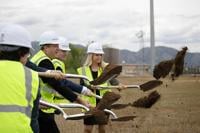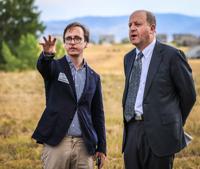The lights are on at the technology campus seeking to become the heart of the Mountain West’s growing quantum industry.
On Thursday, local politicians and leaders of the federally-designated tech hub celebrated the grand opening of the first building for Quantum Commons.
The business park was designed to fast-track the commercialization of quantum computing and solidify Colorado’s role in the sector.
Quantum computing is a rising technology of supercomputers designed to solve problems most classical computers would take years to compute. Experts hope the technology can span from artificial intelligence to helping cure diseases or better understanding the climate.
But the technology’s implementation in the marketplace is still minimal due to the high costs of setting up quantum computers.
At the ceremony, Gov. Jared Polis recognized how the first universal programmable quantum computer was demonstrated 16 years ago in Boulder, which helped earn one of the scientists on the team a Nobel Prize in Physics.
GUEST OPINION: Quantum: It’s the race we can’t afford to lose
“While the rest of the world was just waking up to quantum tech, Colorado’s quantum revolution was already in full swing,” Polis said.
Construction began on the campus in Arvada, along Highway 72, in September.
From left, Gov. Jared Polis, Chris Rork and Rep. Brittany Pettersen shovel dirt in a groundbreaking for a new 70-acre facility dubbed the Quantum Commons on Monday, Sept. 16, 2024 in Arvada, Colo.
The first building completed was retrofitted to become the administration building hosting offices and a coworking space for quantum companies.
Campus plans include adding a 17,000-square-foot lab with rentable quantum equipment that budding startups struggle to buy themselves. It’s set to open in about four-to-five months, said Paul Johnson, president of the Colorado School of Mines, who owns and operates the property.
After that, there will be a 10,000-square-foot building to prototype and manufacture products.
That building will be able to fabricate photon-integrated circuits, said Jessi Olsen, Elevate Quantum’s chief operating and finance officer.
“This is an important component as we think about securing quantum supply chains,” she said.
By using photons instead of electrons, she explained the circuits can help miniaturize quantum computers.
“What it is trying to solve for is that our quantum computers and sensors are really big right now,” Olsen said.
This first phase — only a small portion of the 70-acre campus — is expected to be completed by the end of 2026. And after that, leaders of the hub hope the campus will successfully attract quantum companies looking to set up operations in Colorado and be close to all the action.
“I hope we’ll be able to tell you about development here on the site and people who have just decided to come here to make their home,” Johnson said about finishing the first phase. “And that would be a great next step here.”
The tech hub is also working with major corporate partners such as IBM and Nvidia to boost workforce development programs and get more skilled labor into the quantum industry.
Success! Thank you for subscribing to our newsletter.
The Denver skyline is visible from the new, 70-acre facility dubbed the Quantum Commons in Arvada, Colo. on Monday, Sept. 16, 2024.
Colorado seen as key to national goal of outpacing China’s technology
Elevate Quantum, the Denver-based nonprofit representing the Mountain West quantum tech hub, won the final round of funding from the Biden administration’s program created to supercharge tech hubs across the country that lead in key industries the U.S. wants to advance in.
Quantum is especially important for the U.S. as it races to beat China in dominating the industry. Officials and industry leaders have grown increasingly concerned over how much more China is investing in commercializing quantum.
The tech hub received more than $100 million in federal and matching state grants, much of which is being used to fund the campus and turn it into quantum’s version of the Stanford Research Park in Silicon Valley.
Colorado’s quantum tech hub beats Illinois for coveted federal award
Colorado locked in its funding before President Donald Trump took office, as six other tech hubs in the program lost out on their grants. U.S. Secretary of Commerce Howard Lutnick stated the earlier process was rushed and unfair, and that the previous administration awarded grants for the six which there was no funding for yet.
But the Trump administration seems like it will continue the tech hub programs established in 2022, though Lutnick said those six regions will have to reapply again for the next phase of funding set to open this year.
“At my direction, the Commerce Department is revamping the Tech Hubs program to prioritize national security, project quality, benefit to the taxpayer, and a fair process,” Lutnick said.
Olsen of Elevate Quantum said they’ve gotten support from both administrations for the quantum industry.
“We’ve actually been very fortunate,” Olsen said. “It’s a pretty bipartisan issue given implications for national security and national competitiveness.”
Still, even though the tech hub got funding, she said Trump’s wide-ranging federal cuts to reduce government spending could make it harder for quantum startups doing expensive and risky work to get their ideas running off the ground.
“While there are lots of opportunities for private funding, there is still this need of the government to play a role and fund some of these early-stage technologies and help make some of those big bets,” Olsen said.
As federal spending cuts continue, Olsen said Elevate Quantum is preparing to be an advocate on why it’s an important science to fund.
Elevate Quantum CEO Zachary Yerushalmi shows Gov. Jared Polis around the Quantum Commons campus.
Courtesy photo, Elevate Quantum
She said the campus has officially signed two companies to be tenants: Bifrost Electronics and Entanglement Inc.
The first is a startup that was born out of the Colorado School of Mines and the second is based in Florida but is partnered with Denver’s Maybell Quantum Industries.
There are several more companies that have signed letters of intent but are still having contracts ironed out, Olsen said.
By the end of the year, she said they aim to be about 85% to 90% occupied in the first building.
“We’re working hard to be a little bit agnostic in terms of the type of technology, not trying to pick favorites,” Olsen said. “But really where we’re focused is we are looking for the companies that are reaching that prototype stage”




